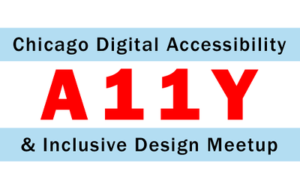What Happens When User Experience Leaves Out All Users?
by Beth
 Before I went to Accessibility Camp Chicago Saturday, I had no idea that the two letters “UX” is tech shorthand for “user experiences.” Accessibility camp taught me a lot. Most importantly, I now know that there’s an acronym for user experiences that are not user-friendly for all users. That word is SUX.
Before I went to Accessibility Camp Chicago Saturday, I had no idea that the two letters “UX” is tech shorthand for “user experiences.” Accessibility camp taught me a lot. Most importantly, I now know that there’s an acronym for user experiences that are not user-friendly for all users. That word is SUX.
SUX stands for “some user experience” as in user experiences that are designed for the majority of users but don’t bother ensuring they’re usable and accessible for all.
The term was coined by Billy Gregory, a presenter I heard at camp Saturday. He’s the Director of Training at an accessibility consultancy firm called the Paciello Group, and during his presentation he wondered out loud about how it is that so many designers and developers who talk about design and usability shy away from accessibility. “If your whole job is to design a user experience, why wouldn’t you want that first word ‘users’ to be more? Why wouldn’t you want more people to be able to use the stuff you worked so hard to design?”
He told us that the SUX idea came to him a couple years ago. “So many designs are so, so close to being fully accessible,” he lamented. “But then they stop just short of being usable by everyone, including people with disabilities.” Gregory called the “just short” phenomena some user experience. “So many more user groups could use the technology if developers just spent maybe another 10 minutes, or another hour, just planning it a little bit better.” Once Gregory realized that his term “some user experiences” could shorten to SUX, he went, where else? To Twitter!
His tweet, “When UX doesn’t consider ALL users, shouldn’t it be known as “SOME User Experience” or… SUX? #a11y.” When the tweet went viral, Gregory got to work gathering examples to share on Twitter. “I must have struck a nerve with a lot of developers,” he said. “They got behind it.”
And you know, I’ve been noticing the word “accessible” coming up more often in conversations about web sites and apps lately, too. Others I talked to at Accessibility Camp Chicago said they’ve been hearing more and more people mentioning accessibility when it comes to web design. “It’s not a dirty word any more,” one said to me.
I’m not exactly sure why that is. Maybe their legal staff is telling them to. Maybe they think it’s the right thing to do. Or maybe, just maybe, they understand that bringing more users to their sites – and keeping them there – is good for business.
“It’s not just people with disabilities,” Gregory pointed out in his talk. “I see my parents, as older users, needing more help surfing the web now.” His parents don’t really understand what it his their son does for a living, he told us, using a story about taking his parents out for dinner as an example. “When the menus came and it was time to order, my mom pulled out a magnifying glass and my dad pulled out a flashlight. These are two people that have no idea what accessibility is, but they’re both using forms of assistive technology,” Gregory said.
When he specifically mentioned his father’s frustration dealing with carousels on web sites, a collective groan came from the crowd. We felt his pain. Carousels. Ugh. “He uses an iPad now, his reaction time is slower than it used to be, and it’s tough for him when he sees something, goes to click and it changes. He ends up on a page that he doesn’t wanna be on. Then he’s gotta go back, and he doesn’t get it.”
Gregory urges developers to consider the aging population along with users who have disabilities when designing new sites. “Every person fortunate enough to live a long life will experience one change or another, and those kind of changes will leave them needing some sort of assistive technology,” he said. “That’s a lot of potential users out there.”
As my Seeing Eye dog Whitney guided me outside after Billy Gregory’s talk, I felt hopeful — and happy. “They understand us, Whitney!” I told her, giving her a scratch on the ears. “We’re not alone. Those people are with us.”






